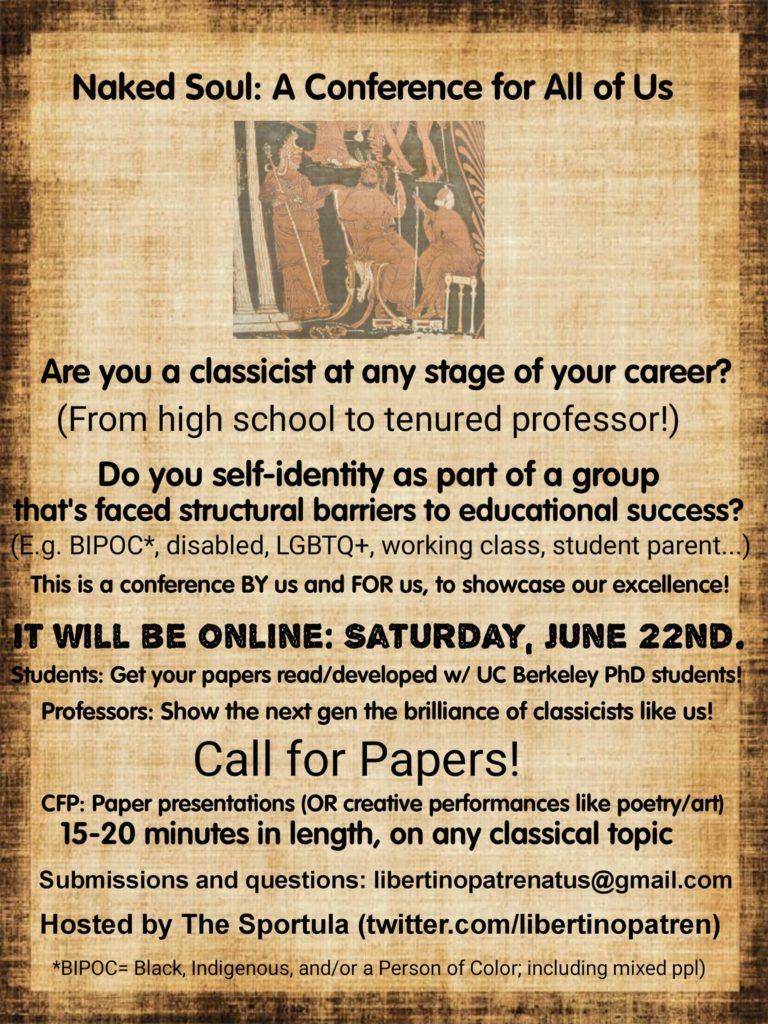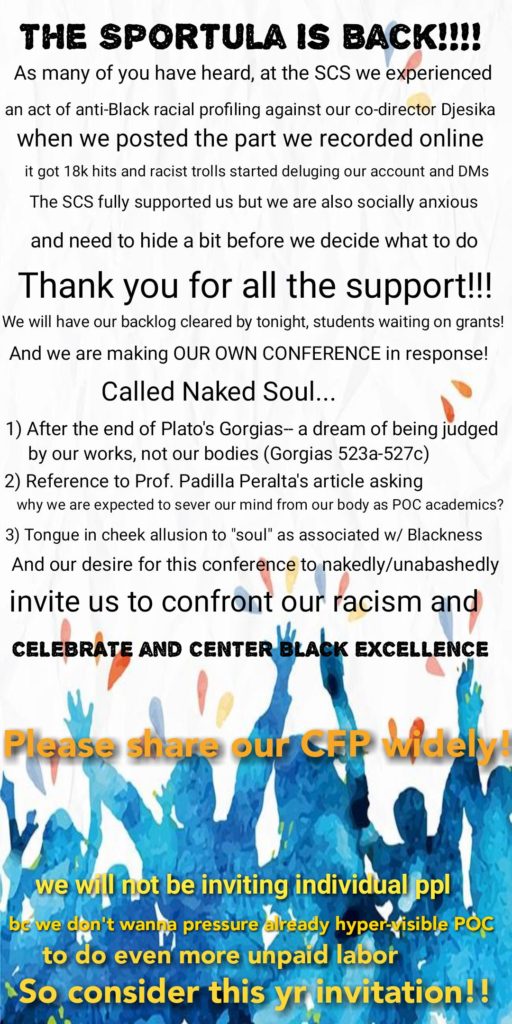I wanted to share some reflections on the recent Naked Soul conference organized by The Sportula (in particular, Kiran Mansukhani and Nicole Nowbahar organized the conference, and they deserve a lot of credit for the wonderful job they did). In part, I’m hoping that this will encourage people who couldn’t attend to go watch the recordings of the talks, once they’re available. But I’m also writing this because I think this model is something we should consider using for a lot more conferences.
As a courtesy, here’s the tl;dr version: the format was excellent and permitted and promoted a lot of great things. I think this format should be used far more in the future for a lot of reasons you’ll have to read the rest to hear about. Also, the papers were amazing and I am very excited about the future of the field. And the organizers were spectacular!
The Who/What/Where
The conference took place over Zoom on June 22nd. The full schedule is available here. There were 9 excellent papers, divided into a panel on Gender Expectations and Instability, one on Classical Reception(s), and one on Marginalization in Antiquity. There were also 2 breakout sessions which gave people opportunities to have conversations and network.


The Why
This conference was organized in response to the events of the 2019 SCS. The title (Naked Soul: A Conference for All of Us) was chosen for several reasons that highlight Black excellence. The call for papers invited classicists at any career stage who self-identify as part of a group that’s faced structural barriers to educational success.
Overall, the conference was really a wonderful experience. The papers discussed disability, incarceration, race and ethnicity, drag and non-binary identification, arranged marriage and sexual violence, and a lot of other things. You can read responses from participants here, if you want to a get a sense of the real-time experience. Because everyone was participating online, the online conversations were extra robust for this conference, as opposed to a side-conversation that’s happening while in-person attendees are having their own conversations. Here, everyone was talking in online spaces — Twitter and the Zoom chat feature. People could link resources to one another and look things up on the fly, which made for richer and more useful discussions. Also, it made it easier for everyone to follow along. At a traditional conference, I just wouldn’t attend a paper on a topic that I didn’t think I knew enough about to get much out of the paper. Here, I could easily look things up while watching a talk, which meant that I got to learn about a lot of new things!
In terms of the content of the talks, almost all of the talks were the sort of talk that rarely occur at, say, the SCS. In my personal opinion, a lot of classics papers that try to use gender theory fall short. For example, I’ve seen some papers that do a good job of applying transgender theory to ancient texts . . . and a lot that fall very short. The same applies to almost any “difficult topic” — there are some examples of great work and there are many others that perpetuate harmful ideas about sexual violence, gender identity, race, etc. This conference involved a spectacular lineup of papers that did a very good, thoughtful, nuanced job of engaging with topics that don’t get enough attention in the field. I’ve heard some people discuss the content as “just as good as a normal conference” as though there’s an assumption that it wouldn’t be. I want to be clear that, despite the junior status of most of the presenters, the papers were more innovative and insightful than those at a lot of traditional conferences.
On that note, I don’t think it’s a coincidence that the presenters at the conference were far more diverse than your average classics conference. The organizers specifically looked for people who are marginalized in our field and as a result, the conference centered experiences and identities that I’ve never seen centered at any conference. These are voices that we need to include in discussions about the field and its future — they bring new perspectives on texts and new ideas about what this field can and should be.
Another great thing about this format was that it was more accessible. People could check in and out of the talks as their bodies and minds required. I would switch to my phone intermittently to be more mobile, when there were things I needed to do. Participating in this conference didn’t preclude getting anything else done with my Saturday — this is an even bigger perk for people with more personal obligations than I have (childcare or other caretaking responsibilities). I could take my puppy for a walk or do other chores while still listening to a talk. I could make food instead of buying some overpriced hotel food at a conference. People who needed to rest could do that. People who needed to get fresh air could do that.
A few other perks of this conference arrangement:
- Environmentally friendly! No flights, no paper handouts, no problem!
- No need for fancy conference garb. If I’d anticipated turning on video during the conference, I would have been a little more put together, but there was no expectation of wearing a blazer (my least favorite type of clothing) or anything else that people didn’t want to wear. Comfiest conference I’ve ever been at!
- People all over the country and the world could participate, without massive costs and travel time. As fewer and fewer people are provided with funding from their institutions (which is to say that more and more people are in contingent positions), this is a far more ethical way to hold a conference, to promote maximum participation and access to people from all over the place.
I’m really looking forward the official organizer response, post-conference, because their experience and perspective will be really valuable to anyone planning to organize a similar conference. And I do think more and more people should think about this type of conference!


no replies